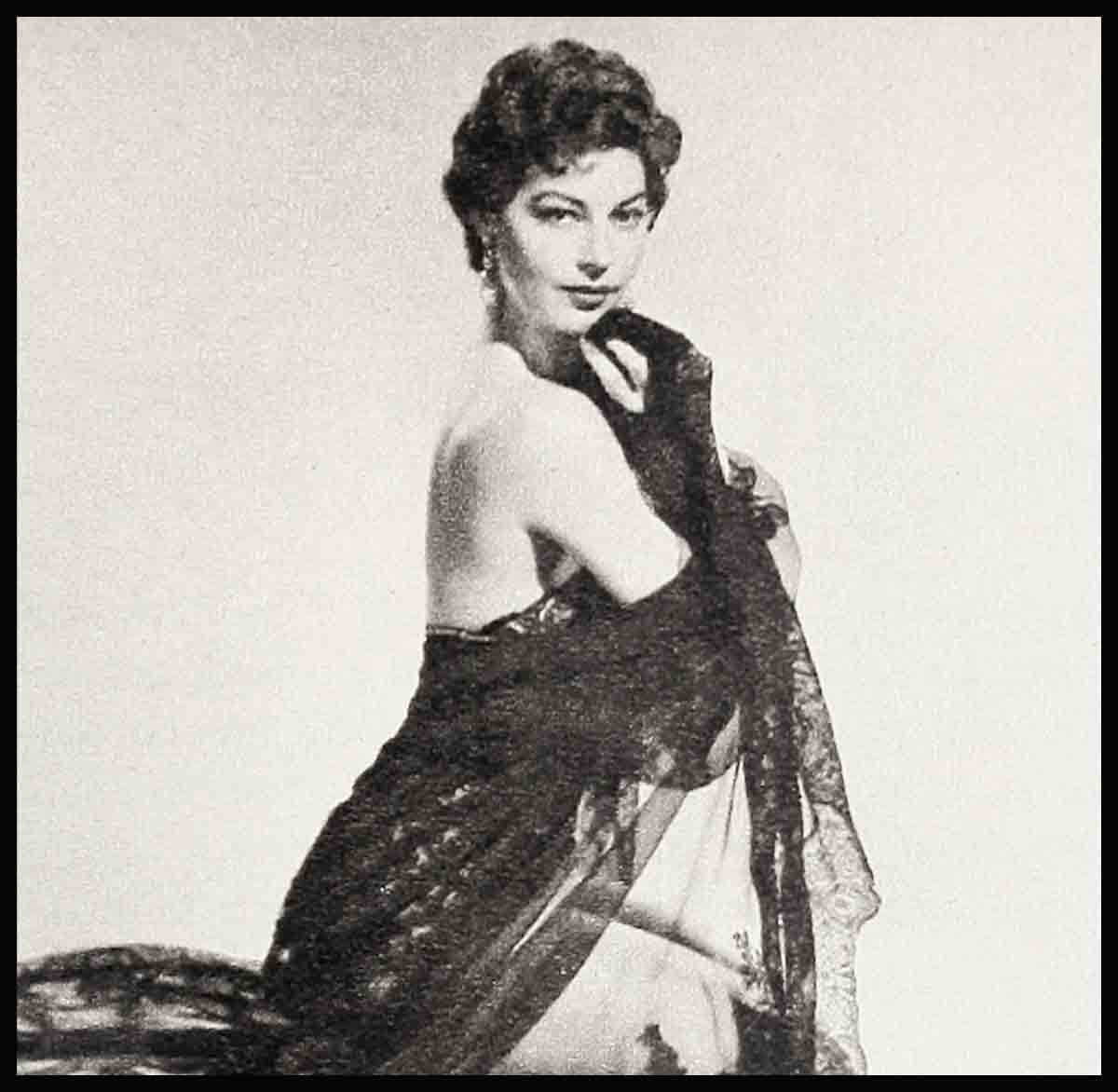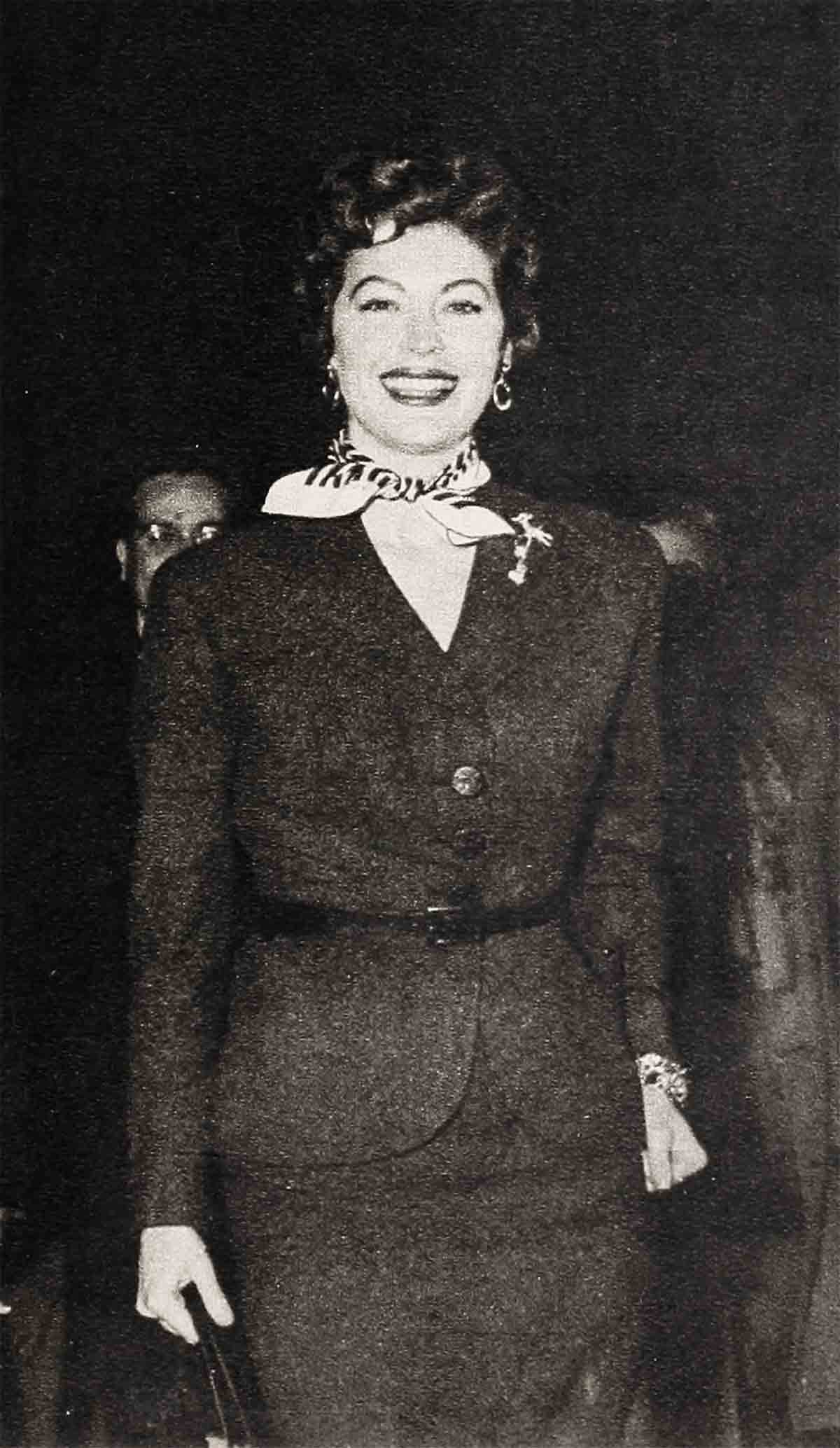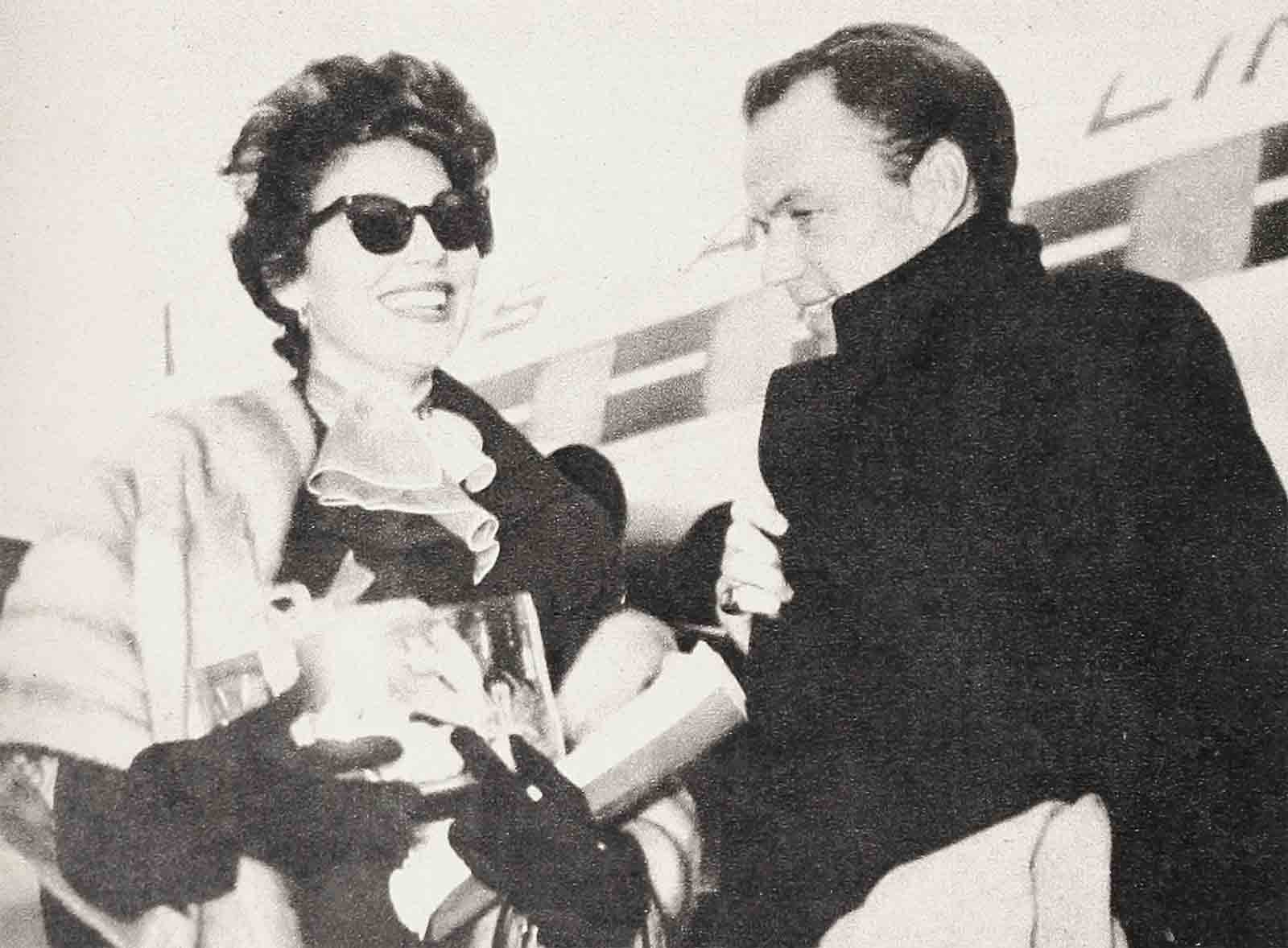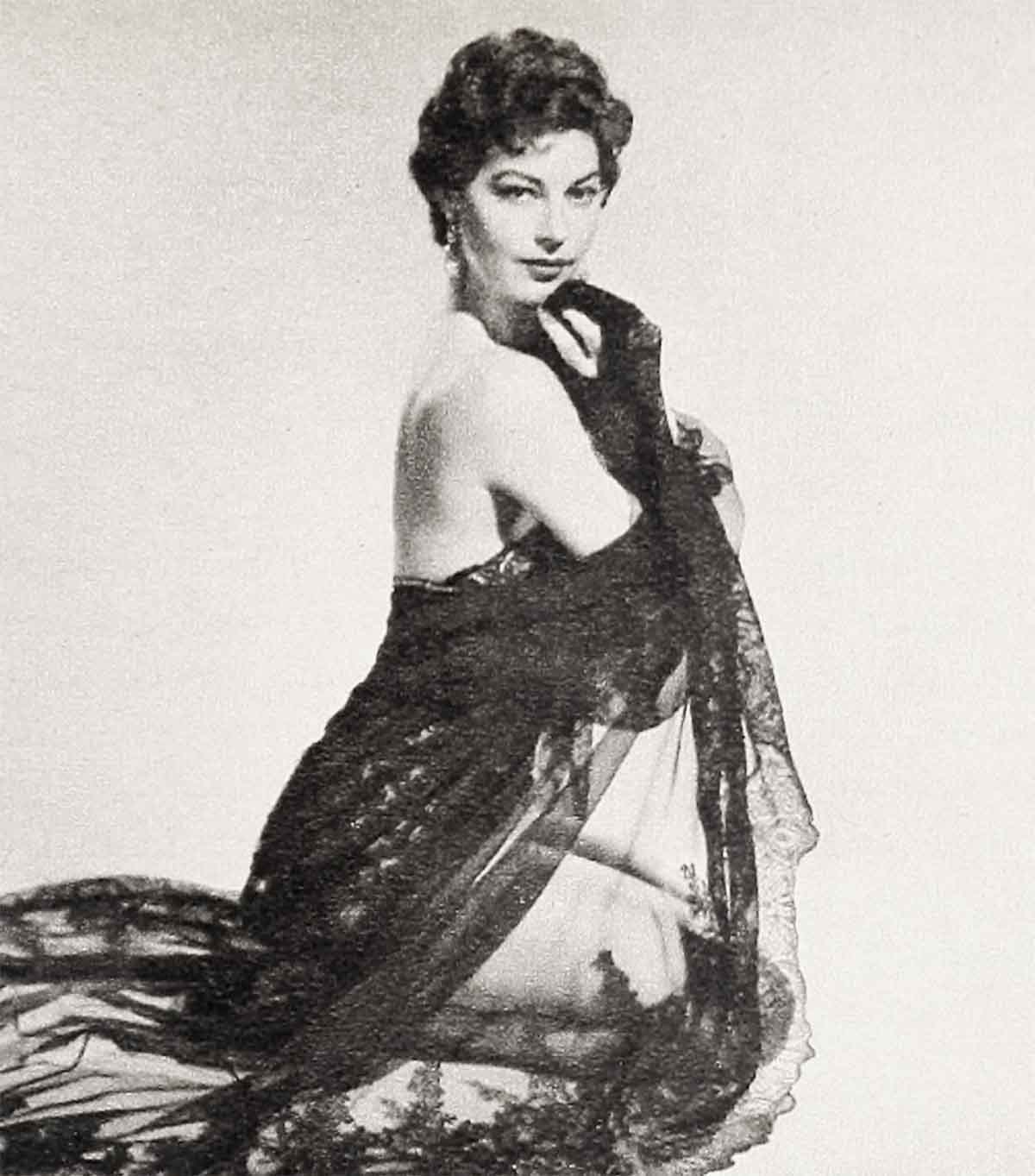
Ava Gardner: “I Couldn’t Live Without Being Married”
“And which man inside this house is not dirty? Who? Name him for me. Which of the men inside would you have play the prince for me?”
The biting words came from the inviting lips of Ava Gardner. Director Joe Mankiewicz called “cut” and Ava and “Bogey” Bogart, her co-star, walked off the set, after doing a highly-dramatic scene in “The Barefoot Contessa.” But the air still seemed to be filled with the powerfully charged dialog that Ava had spoken with such remarkable conviction. What she said so furiously about men was spoken as a woman, a distressed and troubled woman whose failure to establish a secure relationship with a man has left her bitter and discouraged.
As Ava, dressed in a striking black, gold-embroidered slack outfit, rested on the sidelines, she seemed small and wistful. How like a lost child a worldly woman with a bruised heart can be! That Ava is worldly, no one who knows her cares to deny. That she is lost, no one knows better than she.
Fortunately, she has had to work like a slave on “The Barefoot Contessa,” a film that will have even greater audience appeal than Joe Mankiewicz’s “All About Eve.” Ava has had to learn Spanish, has had to learn to dance, has had to tackle the most difficult and mature role she has ever been lucky enough to have. Nevertheless, being Ava, she has sought pleasure whenever she has had a chance to relax. The urge for excitement is as much Ava as her splendid brunette beauty and her electrifying appeal for men. She goes to considerable lengths to satisfy her whims. She can be as tempestuous in her language as she is impetuous in her romances with men she finds attractive. But the painful situation she is in with husband Frank Sinatra and her genuine loneliness have not been assuaged either by work or play, and never will be.
Naturally the gossip—which is inevitably as thick around Ava as heavy smoke around a fire—has spread wildly in and from this sophisticated and cosmopolitan Italian capital. Reports had it that Ava was having an extended romance with handsome Rossano Brazzi, who has an important role in “Contessa;” was breaking up the engagement between Lucia Bose, sultry Italian star, and comedian Walter Chiari; was dining much too often with the good-looking, young Chilean star in European films, Octavio Senoret; was practicing bull fighting with a wide assortment of Spanish and Mexican toreadors; was doing Rome’s few night clubs with princes, counts, millionaires, and mere acquaintances who just happened to be around and had a few laughs to offer; and to top it off, was having wild parties in her charming house right in the heart of the Eternal City. Etcetera, ad infinitum.

Against this smoky mixture of much fiction and little fact, however, picture Ava quietly sitting home with Beatrice Gardner, her sister-companion, ignoring maids, cooks and telephones nights on end, gorging on southern-fried chicken which they themselves prepared. And listen to the poignant story of the gift Frankie sent to Ava, as told by messenger Lauren Bacall, who brought it along when she came to Rome to join Bogey.
“Frankie called me several times,” Baby Bacall drawled in her inimitable manner. “He kept asking me anxiously if I would take a present over to Ava. I kept saying, ‘Of course, why not, darling,’ wondering whether he expected me to fly a piano across. The day I caught the plane, Frankie appeared with a medium-sized box.” Lauren, arms akimbo, her head tilted, almost shrieked, “A cocoanut cake! Get that! ‘Ava loves cocoanut cake,’ Frankie said. ‘I had it made specially for her.’ Of course I took it with me. I balanced that precious piece of pastry for six thousand miles across land and sea and over mountains and valleys, and I got it to Ava safely!”
Ava wept when she got “that precious piece of pastry.”
There’s a remarkable parallel between Maria, the “Barefoot Contessa,” and Ava, the “Box-Office Queen.” Both came from extreme poverty. Both rose from financial and emotional insecurity to fabulous success as world-renowned film personalities. Both found no peace for themselves in love. Both had little faith in their relationships with men. What happens to Maria, the extraordinarily beautiful girl born in the filth of Madrid, has given Ava much food for thought about her own future.
Asked whether the parallel had struck her when she decided to do the film, Ava laughed. “Of course it did. How could I escape it. I understand Maria. I know her very well.” paused. “Perhaps too well. She’s real and she’s realistic. She learned very early in life that you mustn’t dare let yourself expect too much from men.”

Suddenly, Ava sprang up from her chair and grabbed a cigarette. “And who taught her that cruel lesson?” The question hung in the air until she lit her cigarette. “Who else but men?” Ava spoke slowly, feeling her way with her words as she nervously walked back and forth.
“They took advantage of her sensitivity. They took advantage of her poverty. They took advantage of her defenselessness. They took advantage of her desire for love.” She stopped for a minute, then went on. “But you see how it goes. All the hurts left in a woman never destroy her capacity or her need for love.” She sat down again. “Isn’t that just like a woman?” She winked and grinned broadly. Ava has a warm and meaningful grin.
Since she obviously felt pretty down on Twentieth Century men, would she have preferred life in the days of King Arthur with which she became familiar during the making of MGM’s “Knights Of The Round Table?”
Ava let out a whoop. “I should say not! Let that thought perish right out of your masculine mind this second,” she commanded with mock imperiousness. “All that bowing and scraping and horses and trappings and ceremony! All that going off to wage battle in honor of fair ladies couldn’t camouflage the naked fact that males weren’t one whit better then than they are today. Maybe they were worse—if that’s possible.

“And that brings me to something else,” Ava continued. “I think women are raised all wrong, particularly in America. We expect too darned much from life, particularly from men. There’s much too much romance, too many illusions. It all looks so rosy and beautiful, so heavenly from a distance. Then, in the close-up, you’re in it but good. You wonder just how it happened, why nobody prepared you, why nobody had the courage to tell you the truth, why nobody explained just what you were really up against, and what you could do to make a sensible and satisfying life for yourself.
“Some people asked me the other day what advice I would give on marriage.” Ava’s eyes were wide in amazement. “Asked me!” She shook her head in disbelief. “I thought they were joking! Now I ask you, what do I know about marriage? What could I possibly advise anybody else on the subject? I’m the one who could use some good advice.”
However, Ava still feels marriage is essential for her.
“I couldn’t live without being married. I want the things marriage gives a woman. I want them very much. I’m a very womanly woman and I don’t think it’s possible to be a complete person without marriage. I’ve not been a smash hit in the wedding game, but my failure so far hasn’t soured me, at least not completely. In spite of everything that’s happened, I’m still one hundred per cent in favor of that old-fashioned man-and-wife institution.”
What outside of the obvious physical requirements, were the important characteristics she sought in a male?
“A lot of maturity, stability, intelligence, a compassion for the opposite sex and an understanding of their problems. And outside of the obvious physical requirements, that’s a darn good list of what a man ought to look for in a woman.
“But when you’re in love, you can’t see straight anyway. All the things you tell yourself after you’ve been burnt, all the resolutions you make not to repeat the same mistakes, all the promises you make cross-your-heart, all the swearing you do to be cautious the next time—all of it disappears with the ardent kiss of someone you can’t resist. It shouldn’t be that way, but it is that way.” Ava shrugged and made a gesture of helplessness.
The assistant director appeared to tell Ava that Director Mankiewicz was ready for her next scene. Ava doused her cigarette and let the make-up woman freshen her rouge and powder. Ava then patted her hair into place and rose to go.
Only one more question. It was about Frankie. Would she care to answer it? Graciously, she said she would. What were the chances of a reconciliation between them?
She looked away. There was a pause. Finally she spoke, but in a whisper. “If I knew, I’d be glad to tell you. I honestly don’t know. I’m pretty mixed-up. Confused. I just don’t know. You’ve heard the Italian expression that Joe Mankiewicz uses in this marvelous script. Che sara, sara. What will be, will be. What else can I say butche sara, sara?” As she repeated the words, tears sprang into her luminous eyes.
As she walked toward the set, she turned and waved. She again seemed small and wistful—how like a lost child a worldly woman with a bruised heart can be! Then the lines she spoke as Maria came back like an echo!
“And which man inside this house is not dirty? Which of the men inside would you have play the prince for me?”
These are the vital questions which are haunting Ava Gardner. Will she find satisfactory answers for them?
Che sara, sara.
THE END
—BY GENE MORRIS
It is a quote. SCREENLAND MAGAZINE JULY 1954




